THE
-
 ACM Interactions: Demo Hour, March and April 2014 Issue
The
Association for Computing Machinery (ACM), the largest educational and scientific
computing society in the world, publishes a magazine called
Interactions
bi-monthly.
Interactions
is the flagship magazine
for the ACM’s Special Interest Group on Computer-Human Interaction (SIGCHI) with
a global circulation that includes all SIGCHI members.
In
its March and April 2014 issue, the Smart E-book was introduced. It was developed by Sangtae Kim, Jaejeung
Kim, and Soobin Lee at the Information Technology Convergence in KAIST
Institute, KAIST.
For
the article, please go to the link or download the .pdf files below:
Interactions,
March &
April 2014
Demo Hour: Bezel-Flipper
Bezel-Flipper
Interactions_Mar & Apr 2014.pdf
http://interactions.acm.org/archive/view/march-april-2014/demo-hour29
2014.03.28 View 11851
ACM Interactions: Demo Hour, March and April 2014 Issue
The
Association for Computing Machinery (ACM), the largest educational and scientific
computing society in the world, publishes a magazine called
Interactions
bi-monthly.
Interactions
is the flagship magazine
for the ACM’s Special Interest Group on Computer-Human Interaction (SIGCHI) with
a global circulation that includes all SIGCHI members.
In
its March and April 2014 issue, the Smart E-book was introduced. It was developed by Sangtae Kim, Jaejeung
Kim, and Soobin Lee at the Information Technology Convergence in KAIST
Institute, KAIST.
For
the article, please go to the link or download the .pdf files below:
Interactions,
March &
April 2014
Demo Hour: Bezel-Flipper
Bezel-Flipper
Interactions_Mar & Apr 2014.pdf
http://interactions.acm.org/archive/view/march-april-2014/demo-hour29
2014.03.28 View 11851 -
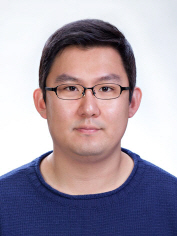 Tae-Wan Kim, a doctoral candidate, receives the best paper award from ECTC
The 2014 Electronic Components and Technology Conference (ECTC) will take place on May 27-30 in Florida, USA. Tae-Wan Kim, a Ph.D. candidate at the Department of Materials Science Engineering (MSE), KAIST, will receive the Intel Best Student Paper Award at the conference.ECTC is the premier international conference that brings together the best researchers and engineers in packaging, components and microelectronic systems science, technology and education in an environment of cooperation and technical exchange. The conference is sponsored by the Components, Packaging and Manufacturing Technology (CPMT) Society of IEEE (Institute of Electrical and Electronics Engineering).The paper describes research on novel nanofiber anisotropic conductive films for ultra fine pitch electronic package application, which was written under the guidance of Professor Kyung-Wook Paik of the MSE Department. In the past ten years, two of his students have received the best paper award from ECTC.
2014.03.14 View 13221
Tae-Wan Kim, a doctoral candidate, receives the best paper award from ECTC
The 2014 Electronic Components and Technology Conference (ECTC) will take place on May 27-30 in Florida, USA. Tae-Wan Kim, a Ph.D. candidate at the Department of Materials Science Engineering (MSE), KAIST, will receive the Intel Best Student Paper Award at the conference.ECTC is the premier international conference that brings together the best researchers and engineers in packaging, components and microelectronic systems science, technology and education in an environment of cooperation and technical exchange. The conference is sponsored by the Components, Packaging and Manufacturing Technology (CPMT) Society of IEEE (Institute of Electrical and Electronics Engineering).The paper describes research on novel nanofiber anisotropic conductive films for ultra fine pitch electronic package application, which was written under the guidance of Professor Kyung-Wook Paik of the MSE Department. In the past ten years, two of his students have received the best paper award from ECTC.
2014.03.14 View 13221 -
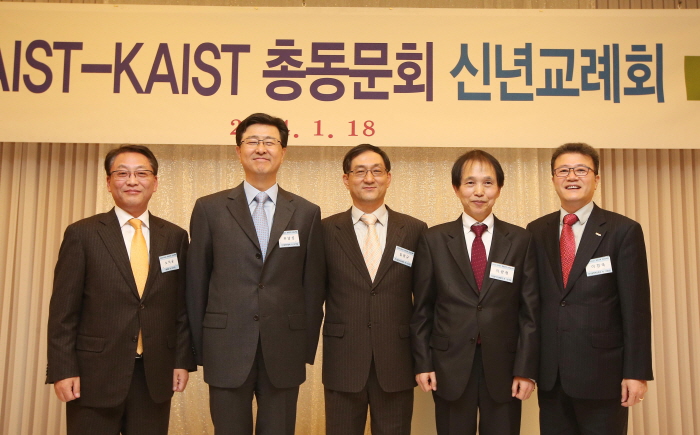 2013 KAIST Alumni of the Year Awarded
The KAIST Alumni Association announced four winners as the 2013 KAIST Alumni of the Year. From left to right, recipients were Nam-Sung Woo, President of Samsung Electronics; Seok-Kyun Noh, President of Yeungnam University; Kwang-Hyung Lee, Professor at KAIST; and Kyung-Guk Lee, CEO of TV Logic.The award ceremony was held during a New Year’s ceremony, sponsored by the Alumni Association, on January 18 at the Palace Hotel in Seoul.President Woo, entering class of ’75 for masters in electrical engineering, was recognized for his devotion to the development of semiconductor industry including expansion of the mobile Central Processing Unit (CPU) business as well as his contribution to national industry development through improving technology for System on Chip (SoC) products.President Noh, entering class of ‘77 for masters in chemistry, was recognized for his devotion to education and the development of science and technology as the co-president of the Promotion Proclamation of the Citizens’ Coalition for Scientific Society and as the head of Human Resources Development for Brain Korea 21 (BK21).Professor Lee, entering class of ’78 for masters in industrial engineering, has been a leader in the collaboration of education and science through founding the Department of Bio & Brain Engineering and the Graduate School of Future Strategy at KAIST. His active support for business ideas from labs has helped produce ventures such as Nexon and IDIS. President Lee, entering class of ’82 for masters in electrical engineering, contributed to the development of HD broadcasting monitors and related items by founding TV Logic. He was also recognized for his devotion to the alumni association.The Alumni Association has been selecting winners who have contributed to society and remain devoted to KAIST since 1992.
2014.01.29 View 8053
2013 KAIST Alumni of the Year Awarded
The KAIST Alumni Association announced four winners as the 2013 KAIST Alumni of the Year. From left to right, recipients were Nam-Sung Woo, President of Samsung Electronics; Seok-Kyun Noh, President of Yeungnam University; Kwang-Hyung Lee, Professor at KAIST; and Kyung-Guk Lee, CEO of TV Logic.The award ceremony was held during a New Year’s ceremony, sponsored by the Alumni Association, on January 18 at the Palace Hotel in Seoul.President Woo, entering class of ’75 for masters in electrical engineering, was recognized for his devotion to the development of semiconductor industry including expansion of the mobile Central Processing Unit (CPU) business as well as his contribution to national industry development through improving technology for System on Chip (SoC) products.President Noh, entering class of ‘77 for masters in chemistry, was recognized for his devotion to education and the development of science and technology as the co-president of the Promotion Proclamation of the Citizens’ Coalition for Scientific Society and as the head of Human Resources Development for Brain Korea 21 (BK21).Professor Lee, entering class of ’78 for masters in industrial engineering, has been a leader in the collaboration of education and science through founding the Department of Bio & Brain Engineering and the Graduate School of Future Strategy at KAIST. His active support for business ideas from labs has helped produce ventures such as Nexon and IDIS. President Lee, entering class of ’82 for masters in electrical engineering, contributed to the development of HD broadcasting monitors and related items by founding TV Logic. He was also recognized for his devotion to the alumni association.The Alumni Association has been selecting winners who have contributed to society and remain devoted to KAIST since 1992.
2014.01.29 View 8053 -
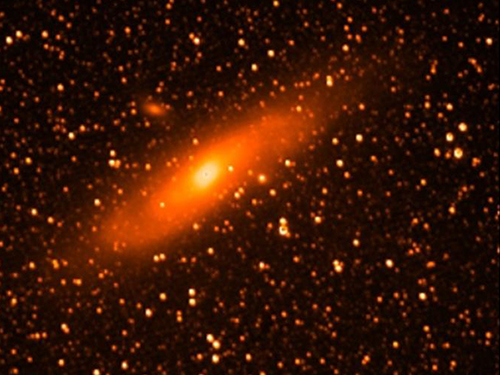 Space Observatory Video by Science & Technology Satellite No. 3 Released
Images of the Andromeda Galaxy, the Orion Nebula, and the Rosetta Nebula taken by the Science & Technology Satellite No. 3, which was built by the KAIST Satellite Technology Research Center and launched at the Yasny launch site in Russia, were released on December 17, 21 st and 22 nd , 2013.
The Andromeda Galaxy (M31) is the nearest spiral galaxy and is located about two million light years away from the earth. The first image received was an infrared image recorded by the space telescope loaded in the satellite.
Research using the satellite’s infrared camera and imaging spectrometer for observing the Earth will also be conducted until February, 2014. After that, the satellite will be collecting images on infrared cosmic background radiation and exploring the galactic plane at a height of 600 km for two years. The infrared and spectrometer images from the Earth observation can be utilized for disaster monitoring and applied to basic research for the detection of wildfires and urban heat island effect as well as flood damage observation and water quality prediction.
Infrared Light Observed in the Universe, Andromeda Galaxy
2014.01.13 View 9497
Space Observatory Video by Science & Technology Satellite No. 3 Released
Images of the Andromeda Galaxy, the Orion Nebula, and the Rosetta Nebula taken by the Science & Technology Satellite No. 3, which was built by the KAIST Satellite Technology Research Center and launched at the Yasny launch site in Russia, were released on December 17, 21 st and 22 nd , 2013.
The Andromeda Galaxy (M31) is the nearest spiral galaxy and is located about two million light years away from the earth. The first image received was an infrared image recorded by the space telescope loaded in the satellite.
Research using the satellite’s infrared camera and imaging spectrometer for observing the Earth will also be conducted until February, 2014. After that, the satellite will be collecting images on infrared cosmic background radiation and exploring the galactic plane at a height of 600 km for two years. The infrared and spectrometer images from the Earth observation can be utilized for disaster monitoring and applied to basic research for the detection of wildfires and urban heat island effect as well as flood damage observation and water quality prediction.
Infrared Light Observed in the Universe, Andromeda Galaxy
2014.01.13 View 9497 -
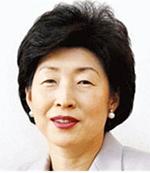 Professor Jung-Ro Yoon Appointed President of Korean Sociological Association
The Korean Sociological Association (KSA) announced that Professor Jung-Ro Yoon from the Department of Humanities and Social Science at KAIST has been appointed as the president of KSA.
KSA has been contributing in the development of sociology and academic exchange among its members as the largest academic association in the field of social science in Korea since 1957.
Professor Yoon said, “KSA is trying to contribute to finding new solutions for economic crises, inequality, environmental pollution, and other uncertainties that we have been facing. We will attempt to provide vision and hope for the future of the society with cooperation from both students and researchers under the motto ‘Sociology for Research, Play and Communication.’”
Dr. Yoon has been in the Department of Humanities and Social Science at KAIST since 1991 after earning her MA & Ph.D. degree from Harvard University. She introduced Science, Technology and Society (STS) into Korea and served as the leader of the Ethical, Legal and Social Implications (ELSI) Project for the Utilization of Human Genome Information.
2014.01.02 View 9104
Professor Jung-Ro Yoon Appointed President of Korean Sociological Association
The Korean Sociological Association (KSA) announced that Professor Jung-Ro Yoon from the Department of Humanities and Social Science at KAIST has been appointed as the president of KSA.
KSA has been contributing in the development of sociology and academic exchange among its members as the largest academic association in the field of social science in Korea since 1957.
Professor Yoon said, “KSA is trying to contribute to finding new solutions for economic crises, inequality, environmental pollution, and other uncertainties that we have been facing. We will attempt to provide vision and hope for the future of the society with cooperation from both students and researchers under the motto ‘Sociology for Research, Play and Communication.’”
Dr. Yoon has been in the Department of Humanities and Social Science at KAIST since 1991 after earning her MA & Ph.D. degree from Harvard University. She introduced Science, Technology and Society (STS) into Korea and served as the leader of the Ethical, Legal and Social Implications (ELSI) Project for the Utilization of Human Genome Information.
2014.01.02 View 9104 -
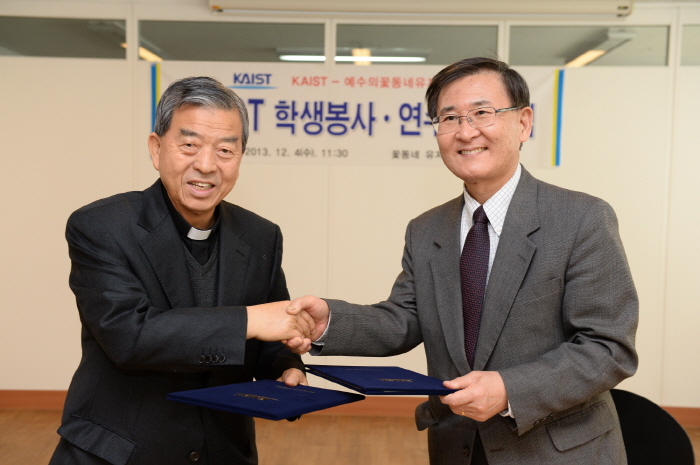 Freshmen join a volunteer program to assist people in need
“Learning how to share love is the first step to start a good, meaningful college life,” said President Steve Kang.
KAIST offers an opportunity to all freshmen entering KAIST in 2014 to participate in a volunteer program to help people in need. Under the program, about 800 students will visit a shelter for the homeless, senior citizens, and orphans, which is called “The Flower Town” located two hours away from KAIST campus.
The town was founded by a Catholic organization, “The Flower Town Preservation Foundation,” to provide housing, education, and health services to the most vulnerable and neglected populations in our society.
President Steve Kang and Woong-Jin Oh, the president of the foundation, made a partnership agreement to promote volunteerism and spread the spirit of sharing and caring among young people, including KAIST students. The participating students will stay at the shelter for a few days and engage in various volunteering activities such as serving meals, cleaning, playing with children, and teaching.
President Kang said, “I am very happy that we are able to give our students a chance to develop into warm-hearted people. Scientists without a heart may bring about modern conveniences but not necessarily the betterment of humanity. Learning how to share love is the first step to start a good, meaningful college life.”
2013.12.30 View 6411
Freshmen join a volunteer program to assist people in need
“Learning how to share love is the first step to start a good, meaningful college life,” said President Steve Kang.
KAIST offers an opportunity to all freshmen entering KAIST in 2014 to participate in a volunteer program to help people in need. Under the program, about 800 students will visit a shelter for the homeless, senior citizens, and orphans, which is called “The Flower Town” located two hours away from KAIST campus.
The town was founded by a Catholic organization, “The Flower Town Preservation Foundation,” to provide housing, education, and health services to the most vulnerable and neglected populations in our society.
President Steve Kang and Woong-Jin Oh, the president of the foundation, made a partnership agreement to promote volunteerism and spread the spirit of sharing and caring among young people, including KAIST students. The participating students will stay at the shelter for a few days and engage in various volunteering activities such as serving meals, cleaning, playing with children, and teaching.
President Kang said, “I am very happy that we are able to give our students a chance to develop into warm-hearted people. Scientists without a heart may bring about modern conveniences but not necessarily the betterment of humanity. Learning how to share love is the first step to start a good, meaningful college life.”
2013.12.30 View 6411 -
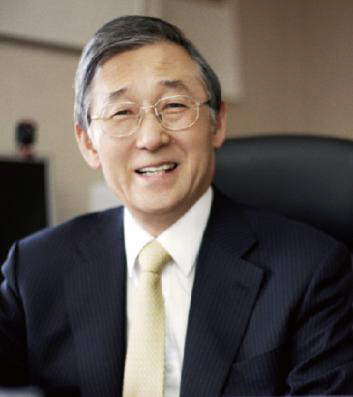 The President of the KAIST Board of Trustees Newly Appointed
President Jang-Moo Lee of the KAIST Board of Trustees
The Board of Trustees, KAIST, met on November 20th at the Marriott Hotel in Seoul. Issues discussed at the board were the appointment of ombudspersons, recruitment of new faculty, and establishment of mid- and long-term development plans for KAIST.
The board also selected its new president, Dr. Jang-Moo Lee, the 24th president of Seoul National University (SNU) from 2006 to 2010 and a professor emeritus of mechanical engineering at SNU. Dr. Lee will serve the board for three years, beginning his duties on November 29th, 2013.
2013.12.10 View 7428
The President of the KAIST Board of Trustees Newly Appointed
President Jang-Moo Lee of the KAIST Board of Trustees
The Board of Trustees, KAIST, met on November 20th at the Marriott Hotel in Seoul. Issues discussed at the board were the appointment of ombudspersons, recruitment of new faculty, and establishment of mid- and long-term development plans for KAIST.
The board also selected its new president, Dr. Jang-Moo Lee, the 24th president of Seoul National University (SNU) from 2006 to 2010 and a professor emeritus of mechanical engineering at SNU. Dr. Lee will serve the board for three years, beginning his duties on November 29th, 2013.
2013.12.10 View 7428 -
 Cambridge University Press and HISTAC to Publish Science and Civilization in Korea
The KAIST Research Institute for the History of Science, Technology and Civilization of Korea (HISTAC) and Cambridge University Press have agreed to publish a 10-volume collection entitled “Science and Civilization in Korea” in collaboration with the Needham Research Institute.
HISTAC was found in December 2012 with the support of the Academy of Korean Studies and the Korean Studies Promotion Service with the aim of publishing a collection composed of 30 Korean books and 7 English books on Korean science and civilization.
By November 2013, the HISTAC research team submitted a research paper composed of 11 Korean and 1 English book. It has now exceeded its initial goal of publishing 7 English books by signing the recent agreement with the Cambridge University Press.
“Science and Civilization in Korea” is the second collection of non-western science to be published by the Cambridge University Press since 1954 following “Science and Civilization in China” by Joseph Needham who is well-known for his momentous achievements in history of science in East Asia. This collection will highlight the achievements of Korea in science and civilization of Korea, much of which has been under-valued compared to those of China and Japan.[ It now has the significance similar to the Western science and civilization].
HISTAC appointed Professor Hong-Gi Yoon from the University of Auckland as the translator and invited Professor Christopher Cullen from Cambridge University and Professor Morris Low from the University of Queensland as co-editors. Professor Cullen was an editor of “Science and Civilization in China” and is now the director of the Needham Research Institute and Professor Low is an expert in modern science of East Asia.
The series includes:
- History of Science and Technology in Korea
- Technology, Everyday Life, and Korean Civilization
- History and Cultural Studies of Geomancy in Korea
- Patients, Doctors and the State: History of Korean Medical and Pharmaceutical Culture
- History of Astronomy in Korea
- Mathematics and the History of Korean Civilization
- The West and Korea in the History of Science and Technology, 1600-1950
- Imperialism, Colonialism, Post-colonialism and Technological Science in Korea
- Development of Science and Technology Under the Korean Authoritarian Regime
- Dynamics of Technological Development in Korean Industrialization
The HISTAC team believes that the publication will illuminate the nation’s triumphs in science and technology and expects that the publication will serve as valuable research resources for the study of the history of East Asian scientific civilization which has mainly focused on China and Japan. Further, by adopting various case studies of scientific achievements of South Korea and developing countries, they hope to propose a new model for studying history of science and civilization.
2013.11.28 View 10030
Cambridge University Press and HISTAC to Publish Science and Civilization in Korea
The KAIST Research Institute for the History of Science, Technology and Civilization of Korea (HISTAC) and Cambridge University Press have agreed to publish a 10-volume collection entitled “Science and Civilization in Korea” in collaboration with the Needham Research Institute.
HISTAC was found in December 2012 with the support of the Academy of Korean Studies and the Korean Studies Promotion Service with the aim of publishing a collection composed of 30 Korean books and 7 English books on Korean science and civilization.
By November 2013, the HISTAC research team submitted a research paper composed of 11 Korean and 1 English book. It has now exceeded its initial goal of publishing 7 English books by signing the recent agreement with the Cambridge University Press.
“Science and Civilization in Korea” is the second collection of non-western science to be published by the Cambridge University Press since 1954 following “Science and Civilization in China” by Joseph Needham who is well-known for his momentous achievements in history of science in East Asia. This collection will highlight the achievements of Korea in science and civilization of Korea, much of which has been under-valued compared to those of China and Japan.[ It now has the significance similar to the Western science and civilization].
HISTAC appointed Professor Hong-Gi Yoon from the University of Auckland as the translator and invited Professor Christopher Cullen from Cambridge University and Professor Morris Low from the University of Queensland as co-editors. Professor Cullen was an editor of “Science and Civilization in China” and is now the director of the Needham Research Institute and Professor Low is an expert in modern science of East Asia.
The series includes:
- History of Science and Technology in Korea
- Technology, Everyday Life, and Korean Civilization
- History and Cultural Studies of Geomancy in Korea
- Patients, Doctors and the State: History of Korean Medical and Pharmaceutical Culture
- History of Astronomy in Korea
- Mathematics and the History of Korean Civilization
- The West and Korea in the History of Science and Technology, 1600-1950
- Imperialism, Colonialism, Post-colonialism and Technological Science in Korea
- Development of Science and Technology Under the Korean Authoritarian Regime
- Dynamics of Technological Development in Korean Industrialization
The HISTAC team believes that the publication will illuminate the nation’s triumphs in science and technology and expects that the publication will serve as valuable research resources for the study of the history of East Asian scientific civilization which has mainly focused on China and Japan. Further, by adopting various case studies of scientific achievements of South Korea and developing countries, they hope to propose a new model for studying history of science and civilization.
2013.11.28 View 10030 -
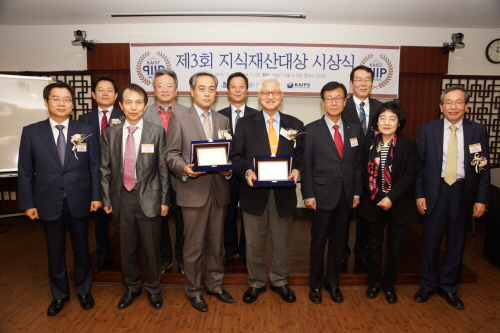 President of WIPA Sang-Hui Lee and SK Hynix Awarded the 2013 Intellectual Property Award
The ceremony for the 3rd Intellectual Property Award was held at the KAIST campus in Seoul on November 2nd. The award is given annually to Korean practitioners in intellectual property.
This year’s recipients were Sang-Hui Lee, the president of the World Intellectual Property Association of Korean Practitioners (WIPA) and the SK Hynix Patent Group which successfully defended a long-lasting claim against a patent specialist corporation.
The Intellectual Property Award (IP Award) is presented in recognition to Korean individuals or groups that contributed to national competitiveness through creation, application, or proceedings of intellectual property, as well as to building the foundation for the protection of patents, intellectual properties, and trademarks.
President Lee successfully hosted the Global Intellectual Property Summit in Seoul, which was held in October 2012. He was a crucial force behind the foundation of WIPA in May of this year and was also elected as the first president for the organization. Recently, President Lee has been at the forefront of job creation through the efficient use of intellectual property and the creative discovery of venture endeavors.
President Lee said, “The unique characteristic of a knowledge-based society lies in the collaboration network of people and knowledge property, startups based on intellectual property, and decentralized development.”
He added, “Just as Finland adopted a policy to build venture companies in utilization of intellectual properties and encouraged the decentralized growth throughout the nation after the collapse of Nokia, Korea must adapt to meet the changing requirements of the knowledge-intensive era.”
The SK Hynix Patent Group, another recipient for the Intellectual Property Award, won the lawsuit, dragged on for 13 years, against the Rambus, an American patent specialized corporation. The group initially lost the first trial in the federal court of California, but through relentless research and efforts, they won the case in the appeals court. The IP Award was co-hosted by the Korea Patent Attorney Association, the Korea Intellectual Property and Service Association, and KAIST.
2013.11.21 View 10047
President of WIPA Sang-Hui Lee and SK Hynix Awarded the 2013 Intellectual Property Award
The ceremony for the 3rd Intellectual Property Award was held at the KAIST campus in Seoul on November 2nd. The award is given annually to Korean practitioners in intellectual property.
This year’s recipients were Sang-Hui Lee, the president of the World Intellectual Property Association of Korean Practitioners (WIPA) and the SK Hynix Patent Group which successfully defended a long-lasting claim against a patent specialist corporation.
The Intellectual Property Award (IP Award) is presented in recognition to Korean individuals or groups that contributed to national competitiveness through creation, application, or proceedings of intellectual property, as well as to building the foundation for the protection of patents, intellectual properties, and trademarks.
President Lee successfully hosted the Global Intellectual Property Summit in Seoul, which was held in October 2012. He was a crucial force behind the foundation of WIPA in May of this year and was also elected as the first president for the organization. Recently, President Lee has been at the forefront of job creation through the efficient use of intellectual property and the creative discovery of venture endeavors.
President Lee said, “The unique characteristic of a knowledge-based society lies in the collaboration network of people and knowledge property, startups based on intellectual property, and decentralized development.”
He added, “Just as Finland adopted a policy to build venture companies in utilization of intellectual properties and encouraged the decentralized growth throughout the nation after the collapse of Nokia, Korea must adapt to meet the changing requirements of the knowledge-intensive era.”
The SK Hynix Patent Group, another recipient for the Intellectual Property Award, won the lawsuit, dragged on for 13 years, against the Rambus, an American patent specialized corporation. The group initially lost the first trial in the federal court of California, but through relentless research and efforts, they won the case in the appeals court. The IP Award was co-hosted by the Korea Patent Attorney Association, the Korea Intellectual Property and Service Association, and KAIST.
2013.11.21 View 10047 -
 Ph.D. students Hyowon Park and Won Ma receive Grand Prizes in Mathematics and Biology respectively.
Researchers in KAIST received best paper awards in two out of three fields at this year’s award ceremony for the “Second Annual Best Thesis Paper Award” held collectively by the Korea University Presidents’ Federation (with Chairman DaeSoon Lee) and the Korean Academy of Science and Technology (with Director GilSang Jung).
Two researchers from KAIST, Hyowon Park (Department of Mathematics) and Won Ma (Department of Biology) received best paper awards.
This prize, given by the both the Korea University Presidents’ Federation and the Korean Academy of Science and Technology since last year, is awarded to researchers and assistant professors who write the most outstanding thesis papers in the field of basic sciences.
Park, who received the best paper award this year, did research on graph braid groups. He was supervised by Professor Kihyung Ko, who received the best supervisor reward.
Ma, who received the best paper award in the field of biological science, researched about the Attention Deficit/Hyperactivity Disorder due to deficiency of the GIT1 synapse protein. His supervising professor also received the supervisor award.
The award ceremony was held in the auditorium of the S-OIL headquarters in Seoul on November 30.
Meanwhile, NASA researcher Jaehwa Lee received the best paper award in the field of earth science, and his supervising professor, Professor Jun Kim from Yonsei University who studies atmospheric science, received the best supervisor award.
2012.12.21 View 12240
Ph.D. students Hyowon Park and Won Ma receive Grand Prizes in Mathematics and Biology respectively.
Researchers in KAIST received best paper awards in two out of three fields at this year’s award ceremony for the “Second Annual Best Thesis Paper Award” held collectively by the Korea University Presidents’ Federation (with Chairman DaeSoon Lee) and the Korean Academy of Science and Technology (with Director GilSang Jung).
Two researchers from KAIST, Hyowon Park (Department of Mathematics) and Won Ma (Department of Biology) received best paper awards.
This prize, given by the both the Korea University Presidents’ Federation and the Korean Academy of Science and Technology since last year, is awarded to researchers and assistant professors who write the most outstanding thesis papers in the field of basic sciences.
Park, who received the best paper award this year, did research on graph braid groups. He was supervised by Professor Kihyung Ko, who received the best supervisor reward.
Ma, who received the best paper award in the field of biological science, researched about the Attention Deficit/Hyperactivity Disorder due to deficiency of the GIT1 synapse protein. His supervising professor also received the supervisor award.
The award ceremony was held in the auditorium of the S-OIL headquarters in Seoul on November 30.
Meanwhile, NASA researcher Jaehwa Lee received the best paper award in the field of earth science, and his supervising professor, Professor Jun Kim from Yonsei University who studies atmospheric science, received the best supervisor award.
2012.12.21 View 12240 -
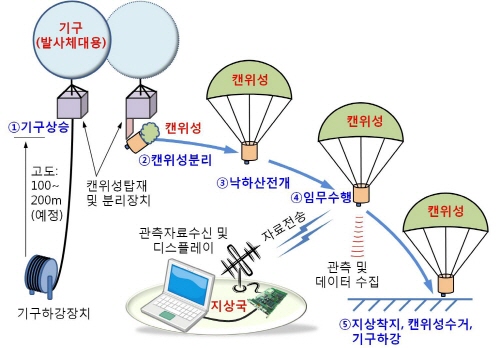 KAIST hosts the first Can Satellite (Cansat) competition
Figure: The cansat is sent up into the air using a balloon and then separated at a certain height. The cansat slowly descends and sends terrestrial observation or atmospheric information back to earth.
KAIST will host the first ever Cansat Competition Korea, in which students from different age groups can participate in building and testing the performance of their custom satellites.
The Satellite Technology Research Center (SaTReC) at KAIST announced that it will take applications for the Cansat Competition Korea until May 25th. A cansat is a can-sized educational satellite that contains the basic elements of a real satellite. It is fired up to a few hundred meters in the air using balloons or small rockets and then separated like a real satellite, collecting data and sending the information back to earth. Cansat competitions are regularly held in the United States or Europe, where they have advanced space development programs, but this is the first time this competition will be held in Korea.
The competition caters to different age groups through a cansat experience science camp for elementary and middle school students and a cansat competition for high school and college students.
The science camp will be held from August 7th to 9th at KAIST and Sejong City and will include satellite education, visits to space development centers (KAIST Satellite Technology Research Center and the Korea Aerospace Research Institute), hand-on experience with basic cansat kits, and other various programs.
The science camp will consist of a maximum of 20 teams comprised of students from fifth to ninth grade. Each team will have an advisory teacher and 3 to 4 students and can apply for the competition at no cost.
The cansat competition will test high school and college students on their personally designed and built can satellites along with the creativity of their mission and developmental outcome.
The preliminary review will choose a maximum of 15 teams, while the secondary review will select the 5 teams that will make the final competition based on their design presentation. On August 9th, these 5 teams will be evaluated on their technical ability, mission capacity and presentation skills. The winning team will be given the KAIST presidential award along with a trophy and prize money.
Doctor Park from KAIST SaTReC explained that countries with advanced space technology actively support cansat competitions to expand the base of the field. He emphasized Korea’s need for regular cansat competitions to actively promote potential space researchers.
More information on the competition can be found on the homepage (http://cansat.kaist.ac.kr) or at the KAIST SaTReC (042-350-8613~4)
2012.05.14 View 13078
KAIST hosts the first Can Satellite (Cansat) competition
Figure: The cansat is sent up into the air using a balloon and then separated at a certain height. The cansat slowly descends and sends terrestrial observation or atmospheric information back to earth.
KAIST will host the first ever Cansat Competition Korea, in which students from different age groups can participate in building and testing the performance of their custom satellites.
The Satellite Technology Research Center (SaTReC) at KAIST announced that it will take applications for the Cansat Competition Korea until May 25th. A cansat is a can-sized educational satellite that contains the basic elements of a real satellite. It is fired up to a few hundred meters in the air using balloons or small rockets and then separated like a real satellite, collecting data and sending the information back to earth. Cansat competitions are regularly held in the United States or Europe, where they have advanced space development programs, but this is the first time this competition will be held in Korea.
The competition caters to different age groups through a cansat experience science camp for elementary and middle school students and a cansat competition for high school and college students.
The science camp will be held from August 7th to 9th at KAIST and Sejong City and will include satellite education, visits to space development centers (KAIST Satellite Technology Research Center and the Korea Aerospace Research Institute), hand-on experience with basic cansat kits, and other various programs.
The science camp will consist of a maximum of 20 teams comprised of students from fifth to ninth grade. Each team will have an advisory teacher and 3 to 4 students and can apply for the competition at no cost.
The cansat competition will test high school and college students on their personally designed and built can satellites along with the creativity of their mission and developmental outcome.
The preliminary review will choose a maximum of 15 teams, while the secondary review will select the 5 teams that will make the final competition based on their design presentation. On August 9th, these 5 teams will be evaluated on their technical ability, mission capacity and presentation skills. The winning team will be given the KAIST presidential award along with a trophy and prize money.
Doctor Park from KAIST SaTReC explained that countries with advanced space technology actively support cansat competitions to expand the base of the field. He emphasized Korea’s need for regular cansat competitions to actively promote potential space researchers.
More information on the competition can be found on the homepage (http://cansat.kaist.ac.kr) or at the KAIST SaTReC (042-350-8613~4)
2012.05.14 View 13078 -
 KAIST Ph.D Mihyun Jang Employed as Professor at Technische Universitat Graz
A Ph.D purely from Korea has been employed as a professor at Technische Universitat Graz.
This is the news of Prof.Mihyun Kang (39) who has graduated from KAIST’s mathematics department. Prof.Kang has transferred on January 2012.
KAIST explained that “it’s the first time for a mathematics Ph.D from Korea has been employed abroad.”
Technische Universitat Graz of Australia is ranked the top third university within the country. It is a global university with 1,700 students from 78 different countries out of its 11,000 students.
Prof. Kang researched mainly theories of combination including random graphing theories, analytical combination theories, and probabilistic combination theories. She has been employed as a lifetime professor through open recruitment where she competed with others through academic debates and interviews.
Technische Universitat Graz valued Prof. Kang’s research highly made her the department head of the ‘Optimization and Discrete Mathematics department’ to create an environment where she could continuously research.
Prof. Kang graduated from Jeju university majoring math educations and did her graduate studies in KAIST. She is a purely ‘Korean’ Ph.D. After her studies, she worked for Germany’s Humboldt University and Freie Universitat Berlin. In 2007, she was able to be employed as a professor in Germany, and in 2008, she was chosen as a Heisenberg fellow.
Prof. Kang who had her research achievements recognized in Germany and Austria was also offered seat as professor in Ludwig Masximilan University of Germany and Alpenadria University in Austria, but chose Technische Universitat Graz.
2012.01.31 View 12476
KAIST Ph.D Mihyun Jang Employed as Professor at Technische Universitat Graz
A Ph.D purely from Korea has been employed as a professor at Technische Universitat Graz.
This is the news of Prof.Mihyun Kang (39) who has graduated from KAIST’s mathematics department. Prof.Kang has transferred on January 2012.
KAIST explained that “it’s the first time for a mathematics Ph.D from Korea has been employed abroad.”
Technische Universitat Graz of Australia is ranked the top third university within the country. It is a global university with 1,700 students from 78 different countries out of its 11,000 students.
Prof. Kang researched mainly theories of combination including random graphing theories, analytical combination theories, and probabilistic combination theories. She has been employed as a lifetime professor through open recruitment where she competed with others through academic debates and interviews.
Technische Universitat Graz valued Prof. Kang’s research highly made her the department head of the ‘Optimization and Discrete Mathematics department’ to create an environment where she could continuously research.
Prof. Kang graduated from Jeju university majoring math educations and did her graduate studies in KAIST. She is a purely ‘Korean’ Ph.D. After her studies, she worked for Germany’s Humboldt University and Freie Universitat Berlin. In 2007, she was able to be employed as a professor in Germany, and in 2008, she was chosen as a Heisenberg fellow.
Prof. Kang who had her research achievements recognized in Germany and Austria was also offered seat as professor in Ludwig Masximilan University of Germany and Alpenadria University in Austria, but chose Technische Universitat Graz.
2012.01.31 View 12476